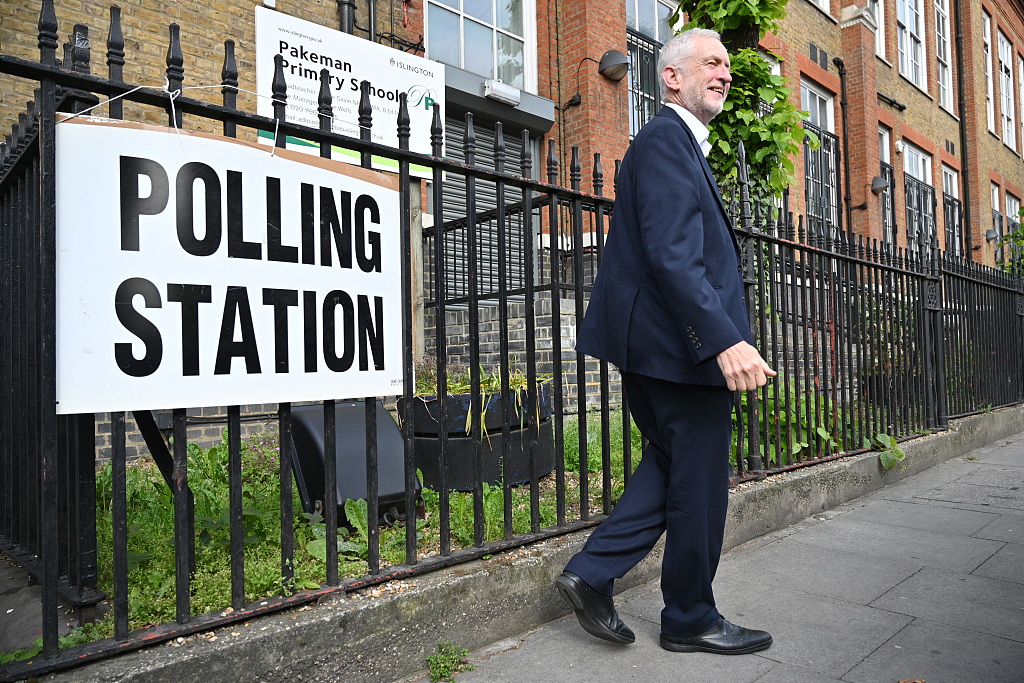

Editor's note: Chris Deacon is a postgraduate researcher in politics and international relations at the University of London and previously worked as an international commercial lawyer. The article reflects the author's opinion, and not necessarily the views of CGTN.
With the news this week that British Prime Minister Boris Johnson has decided to suspend Parliament – known as "prorogation" – for five weeks across September and October in the crucial run-up to the Brexit deadline, many Members of Parliament (MPs) who oppose a no-deal Brexit are concerned they will not have sufficient time to legislate against this eventuality. Is there still enough time and what other obstacles do MPs face in this endeavor?
British MPs return from their summer recess on Tuesday, September 3. Foremost on the minds of almost all of them will be what happens next on Brexit. The majority of MPs oppose Boris Johnson's plans to leave the European Union on October 31 even if no deal has been agreed between the UK and the EU. How they can stop this from happening, however, has always been a more complicated matter.
Although there has been discussion of calling a vote of confidence in the government and, should the government lose, forming an interim "unity" government of multiple parties with the sole purpose of extending the Article 50 period to avoid no-deal, this approach appears to have lost favor.
MPs struggled to agree between them who might lead such a government, with the main opposition Labor Party adamant that their leader Jeremy Corbyn should be the interim prime minister, while the leader of the Liberal Democrats, Jo Swinson, advocated a senior, backbench MP instead.

Labour leader Jeremy Corbyn leaves after voting in the European Elections on May 23, 2019, in London, United Kingdom. /VCG Photo
Combined with this, Johnson’s government has suggested that even if they were to lose a vote of confidence, they would "sit tight," not allowing another government to be formed, and eventually call a general election to be held after Brexit had already happened. This might be unlawful, but the UK’s uncodified constitution would make it difficult to enforce any change of government without a potentially protracted legal challenge.
These MPs, therefore, appear to have settled instead on legislating to avoid no-deal. This process was already undertaken earlier this year, when Parliament made it the law of the land that Theresa May had to go to Brussels to seek an extension. MPs saw this option as likely to work again; however, Johnson’s prorogation has thrown a spanner in the works as there will now be significantly less time available to pass such a law.
MPs may only have one week to pass the legislation before prorogation happens. It is not unprecedented for Parliament to be able to pass law in such a quick period; although tricks such as "filibustering" – when parliamentarians deliberately speak at length to delay proceedings – could slow things down. The government might also seek to add multiple amendments to the bill, which would further delay the process of it moving through the different stages in Parliament.
MPs against no-deal, however, are determined to sit throughout next weekend and throughout the night if that is what is needed to pass the legislation. It is likely that the Speaker of the House of Commons, John Bercow, would be amenable to such efforts given his consistent desire that Parliament’s voice be heard by the government.

Anti-Brexit campaigners, including a man dressed as a clown impersonating Prime Minister Boris Johnson, outside the Cabinet Office on Whitehall, London, August 29, 2019. /VCG Photo
In all likelihood, therefore, it seems there might still be the time to pass legislation stopping a no-deal Brexit, provided the government does not succeed in dragging out the process for too long. That said, there are further difficulties with which MPs supporting this legislation will need to grapple.
The first of these should be relatively easy to overcome – numbers. MPs against no-deal will need a majority in support of their aims. While this might have been up for debate previously, it seems that Johnson’s prorogation measure has only increased the anger against his government within his own party, adding to the number of MPs who will likely support this legislation.
There are also potential difficulties in exactly how the legislation is drafted. The law would have to be completely water-tight so as to prevent Johnson from evading its intent. For example, if the law simply required him to seek an extension, he might make unreasonable demands of the EU to which they would never agree, and yet claim he had still complied with the law by "seeking" an extension.
The legislation might also need to specify how long the extension should be for, so that Johnson does not request one of – for example – only a matter of days or hours. That said, it could be problematic for Parliament to bind the prime minister in this way without knowing what Brussels will agree to.
Next week will be a defining moment for British politics. MPs against a no-deal Brexit will be fighting against the clock to get their legislation passed, while also having to make sure it is worded perfectly so as to prevent any evasion by Johnson. A highly charged week in British politics lies ahead.
(If you want to contribute and have specific expertise, please contact us at opinions@cgtn.com)

Copyright © 2018 CGTN. Beijing ICP prepared NO.16065310-3
Copyright © 2018 CGTN. Beijing ICP prepared NO.16065310-3